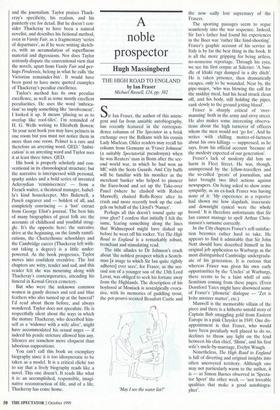A noble prospector
Hugh Massingberd
THE HIGH ROAD TO ENGLAND by Ian Fraser Michael Russell, £24, pp. 382
Sir Ian Fraser, the author of this astrin- gent and far from amiable autobiography, has recently featured in the correspon- dence columns of The Spectator in a brisk exchange over the Balkans with his cousin Lady Maclean. Older readers may recall his column from Germany as 'Fraser Johnson' (a suitably Spectatorial pseudonym) when he was Reuters' man in Bonn after the sec- ond world war, in which he had won an MC with the Scots Guards. And City buffs will be familiar with his moniker as the merchant banker who helped to pioneer the Euro-bond and set up the Take-over Panel (where he clashed with Robert Maxwell), chaired Rolls-Royce after its crash and more recently took up the cud- gels on behalf of the Lloyd's 'Names'.
Perhaps all this doesn't sound quite up your glen? I confess that initially I felt the same, fearing something along the lines that Widmerpool might have dished up before he went off his rocker. Yet The High Road to England is a remarkably robust, trenchant and stimulating read.
The title alludes to Dr Johnson's crack about 'the noblest prospect which a Scotch- man [a usage to which Sir Ian quite rightly adheres] ever sees', for Fraser, as the sec- ond son of a younger son of the 13th Lord Lovat, was obliged to seek his fortune away from the Highlands. The description of his boyhood at Moniack is nostalgically evoca- tive, with its memories of guddling trout, the pot-pourri-scented Beaufort Castle and
'May I see the water list?'
the now sadly lost supremacy of the Frasers.
The sporting passages seem to segue seamlessly into the war sequence. Indeed, Sir Ian's father had found his experiences in the Boer war 'rather like hind-shooting'. Fraser's graphic account of his service in Italy is by far the best thing in the book. It is all the more gripping for being artless, no-nonsense reportage. Through his eyes, we see his first corpse at Salerno: 'A bun- dle of khaki rags dumped in a dry ditch'. He is taken prisoner, then dramatically escapes, only to be wounded. Near by, the pipe-major, 'who was blowing the call for the midday meal, had his head struck clean off, and his body, still holding the pipes, sank slowly to the ground jetting blood'.
Fraser is sharply critical of 'over- manning' both in the army and ciwy street. He also makes some interesting observa- tions about the high turnover of , officers whom the men would not `go for'. And he writes with chilling matter-of-factness about his own killings — suppressed, as he says, from his official account 'because of the modesty expected of our generation'.
Fraser's lack of modesty did him no harm in Fleet Street. He was, though, unimpressed by the fellow-travellers and the so-called 'greats' of journalism, and later brought two libel actions against newspapers. On being asked to show some sympathy, as an ex-hack Fraser was having none of it: 'My experience as a reporter had shown me how slapdash, inaccurate and downright cynical were the whole brood.' It is therefore unfortunate that Sir Ian cannot manage to spell Arthur Chris- tiansen's surname correctly.
In the City chapters Fraser's self-satisfac- tion becomes rather hard to take. He appears to find it admirable that Sir John Nott should have described himself in his original job application to Warburgs as the most distinguished Cambridge undergradu- ate of his generation. It is curious that whereas Fraser was given his own early opportunities by the 'Uncles' at Warburgs, there seems to be a faint whiff of anti- Semitism coming from these pages. (Even Dornford Yates might have disowned some of Fraser's 'phonetic' dialogue — `Zet is kvite anozzer matter', etc.) Maxwell is the memorable villain of the piece and there is a hitherto untold story of Captain Bob smuggling gold from Eastern Europe in a pink Chrysler in 1949. One dis- appointment is that Fraser, who would have been peculiarly well placed to do so, declines to throw any light on the feud between his clan chief, `Shirni' , and his first wife's uncle-by-marriage, Evelyn Waugh.
Nonetheless, The High Road to England is full of diverting and original insights into often uncovered territory. Although one may not particularly warm to the author, it is — as Simon Barnes observed in 'Specta- tor Sport' the other week — 'not loveable qualities that make a good autobiogra- pher'.










































































 Previous page
Previous page